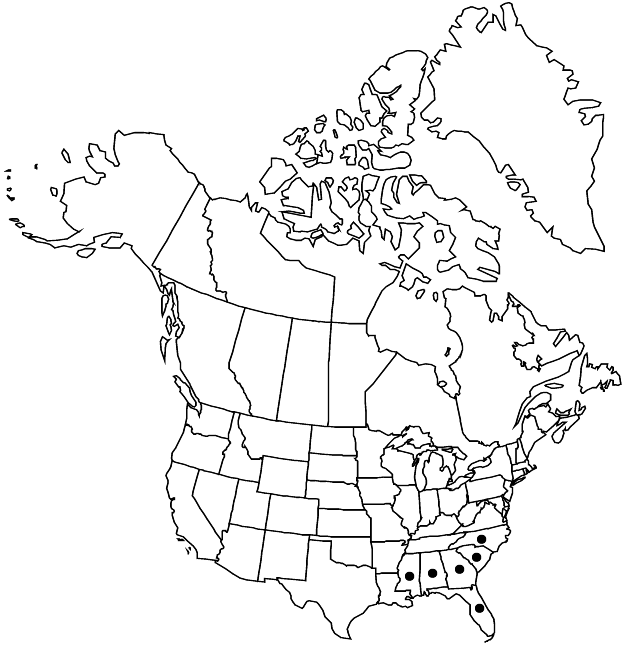Difference between revisions of "Persicaria hirsuta"
Fl. S.E. U.S., 379. 1903.
FNA>Volume Importer |
imported>Volume Importer |
||
| (5 intermediate revisions by 2 users not shown) | |||
| Line 8: | Line 8: | ||
}} | }} | ||
|common_names=Hairy smartweed | |common_names=Hairy smartweed | ||
| − | |basionyms={{Treatment/ID/ | + | |special_status={{Treatment/ID/Special_status |
| + | |code=E | ||
| + | |label=Endemic | ||
| + | }} | ||
| + | |basionyms={{Treatment/ID/Basionym | ||
|name=Polygonum hirsutum | |name=Polygonum hirsutum | ||
|authority=Walter | |authority=Walter | ||
| + | |rank=species | ||
| + | |publication_title=Fl. Carol., | ||
| + | |publication_place=132. 1788 | ||
}} | }} | ||
|synonyms= | |synonyms= | ||
| Line 36: | Line 43: | ||
-->{{#Taxon: | -->{{#Taxon: | ||
name=Persicaria hirsuta | name=Persicaria hirsuta | ||
| − | |||
|authority=(Walter) Small | |authority=(Walter) Small | ||
|rank=species | |rank=species | ||
| Line 50: | Line 56: | ||
|publication title=Fl. S.E. U.S., | |publication title=Fl. S.E. U.S., | ||
|publication year=1903 | |publication year=1903 | ||
| − | |special status= | + | |special status=Endemic |
| − | |source xml=https:// | + | |source xml=https://bitbucket.org/aafc-mbb/fna-data-curation/src/2e0870ddd59836b60bcf96646a41e87ea5a5943a/coarse_grained_fna_xml/V5/V5_1198.xml |
|subfamily=Polygonaceae subfam. Polygonoideae | |subfamily=Polygonaceae subfam. Polygonoideae | ||
|genus=Persicaria | |genus=Persicaria | ||
Latest revision as of 22:08, 5 November 2020
Plants perennial, 3–9 dm; roots also often arising from proximal nodes; rhizomes present. Stems decumbent to ascending or erect, branched, without noticeable ribs, brownish-hirsute on internodes. Leaves: ocrea brown to reddish brown, cylindric, 6–12 mm, chartaceous, base sometimes inflated, margins truncate, eciliate or ciliate with bristles 4–7.5 mm, surface hirsute, not glandular-punctate; petiole 0.1(–0.3) cm, hirsute, leaves sometimes sessile; blade without dark triangular or lunate blotch adaxially, ovate to lanceolate, (2–)4–8 × (0.5–)1–2.5 cm, base rounded to cordate, margins strigose to hirsute, apex acute to acuminate, faces sparingly hirsute abaxially and adaxially, midvein usually hirsute abaxially. Inflorescences mostly terminal, erect, interrupted proximally, usually uninterrupted distally, 20–80 × 4–8 mm; peduncle 30–60 mm, hirsute or, sometimes, nearly glabrous distally; ocreolae overlapping distally, usually not overlapping proximally, margins ciliate with bristles 0.4–1.5(–2) mm. Pedicels ascending, 1–2 mm. Flowers 1–3 per ocreate fascicle, homostylous; perianth white to pink, glabrous, not glandular-punctate, nonaccrescent; tepals 5, connate in proximally 1/3, obovate, 1.5–2 mm, veins not prominent, not anchor-shaped, margins entire, apex obtuse to rounded; stamens 5, included; anthers red, elliptic to ovate; styles 3, connate proximally. Achenes included or apex exserted, dark brown to brownish black, 3-gonous, 2–2.5 × 1.3–1.8 mm, shiny, smooth. 2n = 20.
Phenology: Flowering Jun–Oct.
Habitat: Sandy soils, open areas in savannahs, pond margins, ditches, often in shallow water
Elevation: 0-100 m
Distribution

Ala., Fla., Ga., Miss., N.C., S.C.
Discussion
C. B. McDonald (1980) showed that Persicaria hirsuta is closely related to P. setacea and P. hydropiperoides. Hybrids between P. hirsuta and P. setacea have been produced experimentally but appear to be rare in the wild. Although geographically sympatric, the two species generally occupy different habitats. Experimental crosses between P. hirsuta and P. hydropiperoides were unsuccessful (McDonald).
Selected References
None.